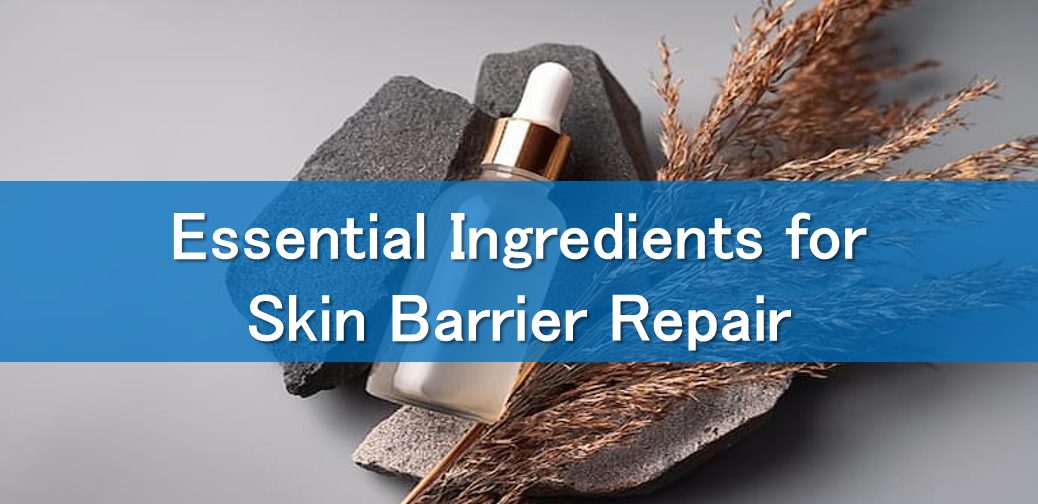
- HOME
- Cosmetic OEM Lab
How to Effectively Repair a Damaged Skin Barrier
How to Support Skin Barrie Restoration in Your Daily Routine
It seems to be gaining a lot of popularity these days, and many skincare brands are now focusing their products around it.
In today’s article, I will explain what the skin barrier actually is, why it’s so important for healthy skin, and introduce some of the best ingredients that can help protect and strengthen it—especially useful when developing or choosing skincare items.
Let’s get started!
Contents

The skin barrier plays a crucial role in protecting the skin from environmental aggressors such as pollutants, harmful bacteria, and UV radiation. In addition to providing protection, the skin barrier also helps to maintain the skin’s moisture balance by preventing water loss, ensuring the skin remains hydrated and healthy. Understanding how to care for and repair the skin barrier is essential for maintaining healthy, smooth skin.
The skin barrier is the outermost layer of skin, essentially a protective wall that shields the body from external stressors, prevents moisture loss, and helps maintain skin health. It is primarily composed of corneocytes (dead skin cells) and lipids (such as ceramides, cholesterol, and fatty acids), which together form a strong, cohesive structure. A healthy skin barrier keeps irritants, allergens, and bacteria out while locking essential moisture in. When the barrier is compromised—due to factors like harsh skincare products, environmental damage, or over-exfoliation—it can lead to dryness, sensitivity, inflammation, and various skin disorders.
A damaged skin barrier can manifest in several ways, including increased sensitivity, dryness, flakiness, redness, and irritation. You may also notice a tight or stinging sensation after applying skincare products, or that your usual routine suddenly causes discomfort. In more severe cases, breakouts, eczema, or rosacea-like symptoms may appear. Because the skin can no longer effectively retain moisture or defend against external aggressors, it becomes more vulnerable to environmental damage and inflammation, which can further exacerbate skin concerns over time.
Several factors can damage the skin’s barrier, including environmental stressors, harsh skincare products, and lifestyle choices. Common environmental culprits include UV radiation, pollution, and extreme weather conditions such as wind, cold, or dry air. Over-cleansing, frequent exfoliation, or using products with high concentrations of alcohol, fragrance, or acids can strip the skin of its natural oils. Additionally, stress, lack of sleep, poor diet, and smoking can impair the skin’s ability to repair itself. Even long, hot showers and certain medications may weaken the barrier over time. Identifying and minimizing these triggers is essential for maintaining skin health.

When it comes to repairing and strengthening the skin barrier, certain ingredients are crucial for restoring its protective function and enhancing its overall health. Here are some of the most essential ingredients for skin barrier repair
These lipids are essential components of the skin barrier, helping to maintain its protective function and retain moisture. The primary lipids—ceramides, cholesterol, and free fatty acids—are arranged in a brick-and-mortar structure, with skin cells acting as the “bricks” and lipids as the “mortar.” This organized structure prevents water loss and blocks the entry of harmful substances like bacteria, allergens, and irritants. When lipid levels are imbalanced or depleted, the barrier becomes compromised, leading to increased TEWL(Transepidermal Water Loss) and skin sensitivity. Replenishing these lipids through skincare—especially with products containing ceramides or omega fatty acids—can help restore barrier integrity and improve overall skin resilience.
A humectant that attracts water to the skin, providing deep hydration and helping to plump up skin cells, which can improve skin barrier function. Common humectants include hyaluronic acid, glycerin, panthenol (provitamin B5), and urea. These ingredients work by drawing moisture from the environment or deeper layers of the skin to the surface, enhancing skin suppleness and preventing dryness. When combined with occlusives and emollients, humectants can play a key role in maintaining a healthy, resilient skin barrier, especially for dry or compromised skin types.
Supports the production of ceramides and fatty acids, which are crucial for a healthy skin barrier. These lipids form the “mortar” between skin cells, helping to seal in moisture and protect against environmental irritants. Ingredients like niacinamide (vitamin B3), omega fatty acids, and cholesterol are known to boost the skin’s natural lipid production. Regular use of such ingredients can help repair a compromised barrier, reduce transepidermal water loss (TEWL), and strengthen the skin’s resilience against sensitivity, dryness, and inflammation.
Squalane, a natural moisturizer that mimics the skin’s own lipids, helping to restore and maintain the skin barrier. It is a stable, saturated form of squalene (a compound naturally produced by our sebaceous glands) that is highly compatible with human skin. Squalane not only provides lightweight yet long-lasting hydration but also helps reduce water loss and protect against oxidative stress. It’s non-comedogenic, making it suitable for all skin types, including sensitive and acne-prone skin. Additionally, it enhances the skin’s suppleness and supports a smoother, healthier-looking complexion.
Fatty Acids are essential for building and maintaining the skin’s lipid layer, which helps to prevent water loss and protect against environmental damage. They are key components of cell membranes and play a crucial role in keeping the skin soft, smooth, and resilient. Common types include omega-3, omega-6, and omega-9 fatty acids, which can be derived from both plant and marine sources. These lipids help soothe inflammation, strengthen the skin barrier, and support the repair of damaged or irritated skin. When included in skincare, fatty acids can enhance overall skin hydration and improve texture and tone over time.

A consistent skincare routine focused on nourishing and strengthening the skin barrier can significantly improve skin health. Below is a step-by-step guide to help you support and repair your skin barrier
Look for formulas that are sulfate-free, fragrance-free, and pH-balanced to support the skin’s natural barrier. Gentle cleansers with hydrating ingredients like glycerin, ceramides, or hyaluronic acid can effectively remove dirt and impurities without compromising moisture levels. Avoid products with alcohol, artificial dyes, or strong exfoliants, which can lead to irritation and dryness, especially for sensitive or compromised skin.
Hyaluronic acid helps attract and retain moisture within the skin, plumping and smoothing its surface, while niacinamide strengthens the skin barrier, reduces inflammation, and improves the overall texture and tone. Together, these ingredients work synergistically to reinforce skin resilience and combat dryness and sensitivity caused by a weakened barrier.
Ceramides help restore the skin’s lipid layer, improving its ability to retain moisture and protect against environmental damage. Hyaluronic acid provides deep hydration by drawing moisture into the skin, while glycerin attracts water from the air, keeping the skin plump and smooth. Together, these ingredients work to maintain the skin’s moisture balance, prevent transepidermal water loss (TEWL), and enhance the overall health and function of the skin barrier.
Broad-spectrum sunscreens protect against both UVA and UVB rays, which can cause premature aging, pigmentation, and skin cancer. UVA rays penetrate deeper into the skin, contributing to aging and fine lines, while UVB rays primarily cause sunburn and can lead to skin cancer. Choosing a sunscreen with at least SPF 30 ensures a sufficient level of protection for everyday exposure, but higher SPFs may be necessary for prolonged sun exposure or sensitive skin. Additionally, make sure to reapply sunscreen every two hours and after sweating or swimming for continued protection.
The skin barrier needs time to regenerate, and constant use of the right products will help accelerate the healing process. Avoid over-exfoliating or introducing too many active ingredients at once, as this can cause further irritation and delay healing. Patience is key—focus on nourishing and hydrating your skin, and be gentle with your routine to allow your skin to recover fully. Over time, you should begin to notice an improvement in the texture, hydration, and resilience of your skin.

A healthy skin barrier is crucial for maintaining optimal skin health and preventing issues such as dryness, irritation, and sensitivity. The key to a strong and resilient skin barrier is using gentle, nourishing products that help retain moisture, protect against environmental stressors, and promote natural repair processes. By prioritizing skin barrier health, you will lay the foundation for smoother, brighter skin, leaving it feeling comfortable and vibrant.
For further information, please contact us.